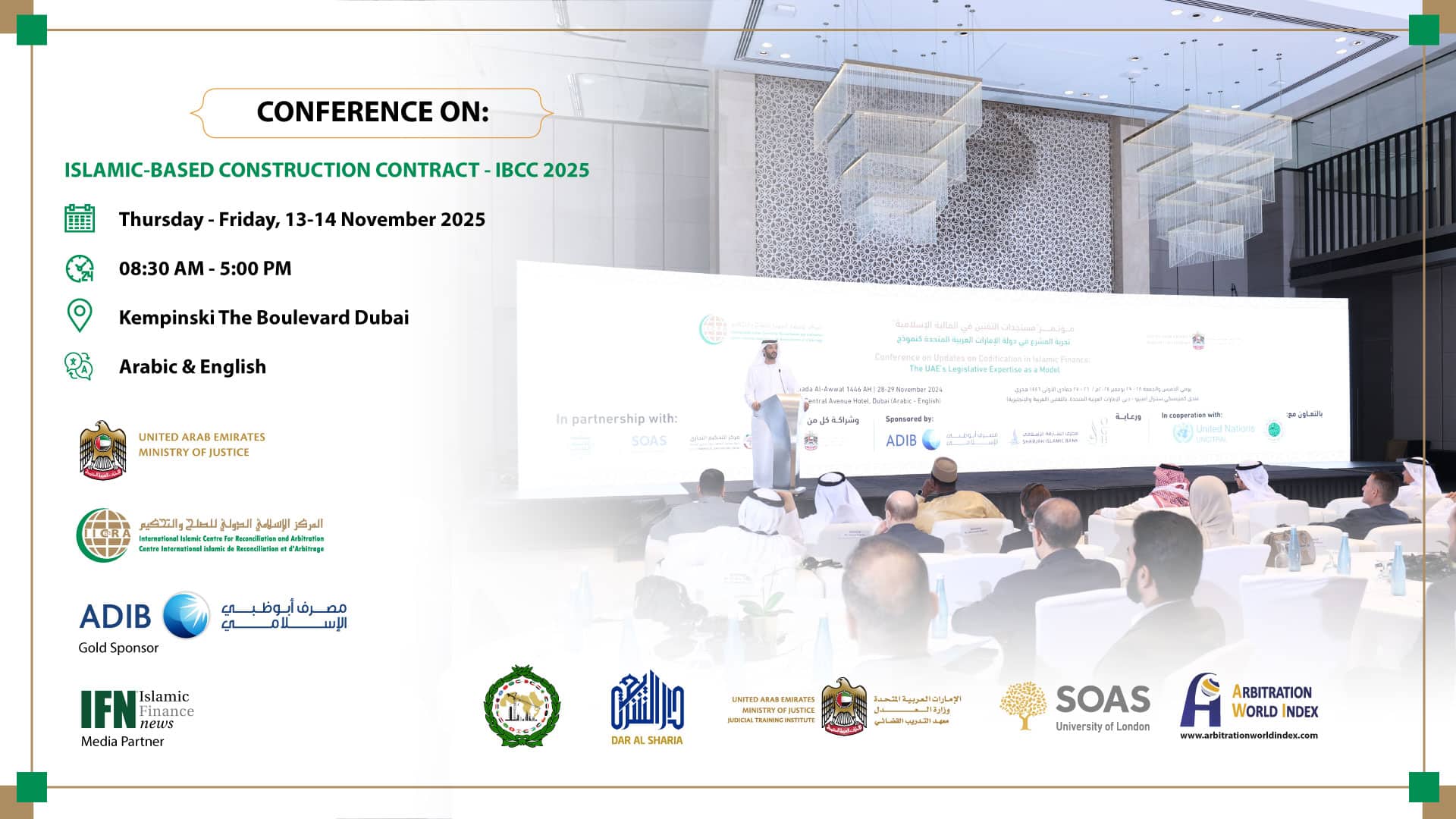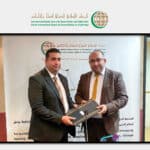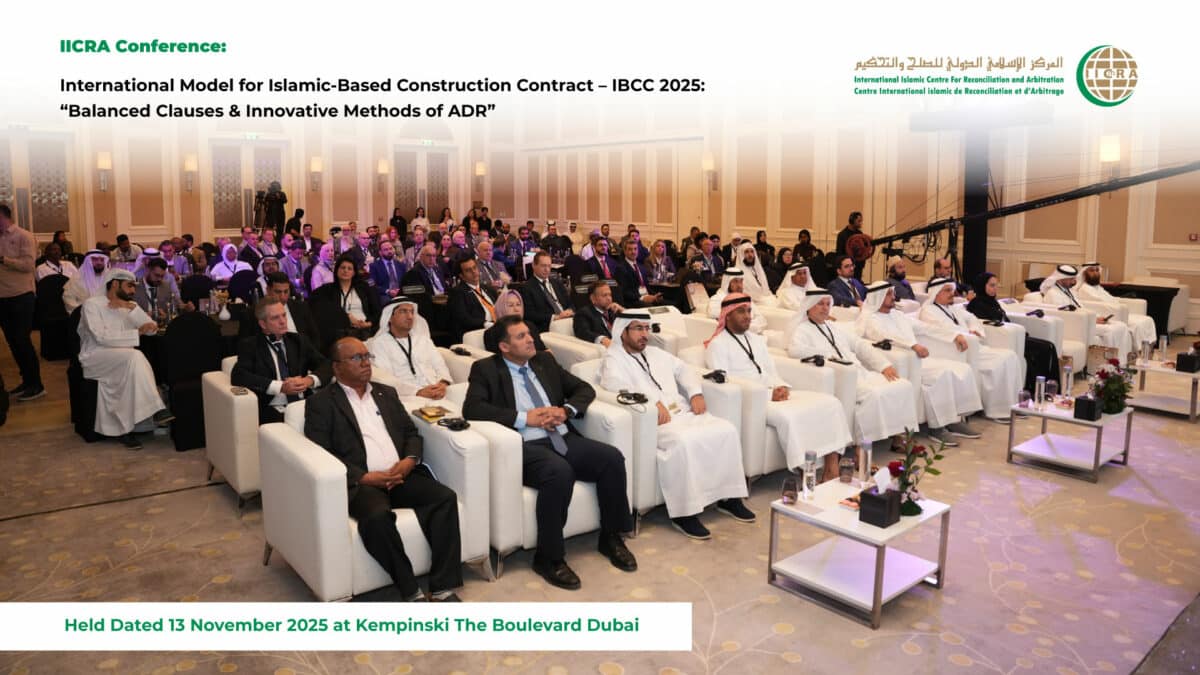
Launch of Islamic-Based Construction Contract – IBCC 2025
22/09/2025
IICRA – AWJ Signing of MOU
26/12/2025The First of Its Kind Worldwide, Launched from Dubai: “Model Islamic-Based Construction Contract – IBCC 2025”
|
Under the patronage of His Excellency Abdullah bin Sultan Al Nuaimi, UAE Minister of Justice, and with the generous sponsorship of Abu Dhabi Islamic Bank (ADIB), the International Islamic Centre for Reconciliation and Arbitration (IICRA) held its annual international conference in Dubai on Thursday and Friday, 22–23 Jumada Al-Awwal 1447 AH, corresponding to 13–14 November 2025. The conference was titled: “Launching the International Model Contract for Islamic-Based Construction Contracts (IBCC–2025): Balanced Clauses and Innovative Dispute Resolution Mechanisms.” In his opening address at the conference, H.E. Abdullah bin Sultan Al Nuaimi highlighted the significance of the event, which marks the official launch of the Model Islamic-Based Construction Contract (IBCC-2025). He stated that the conference represents a pioneering step reflecting the depth and richness of Islamic legal heritage and its capacity to keep pace with the economic and urban developments of the modern world. His Excellency further highlighted the importance of the Model Islamic-Based Construction Contract (IBCC–2025), which complies with Shari’ah Provisions, as a valuable initiative toward unifying concepts and regulating contractual practices across Arab and Islamic countries on sound foundations, derived from the richness of Islamic jurisprudence and harmonized with international standards adopted by FIDIC contracts, yet framed in a way that respects Islamic particularities and ensures compliance with its provisions. He also commended the wise leadership of the United Arab Emirates, which, since its founding, has embraced a forward-looking vision as a young and ambitious nation. The UAE has developed legislation reflecting its role as a global hub for multicultural business. Article (2) of the Civil Transactions Law stipulates that the interpretation of its provisions shall be governed by the rules and principles of Islamic jurisprudence, an affirmation of the UAE legislator’s commitment to this vision. Recognizing Islamic jurisprudence as an authentic source of civil legislation, Federal Decree No. (31) of 2021 concerning the Crimes and Penalties Law also emphasized liability in construction contracts, imposing deterrent penalties on those who breach their contractual obligations, thereby safeguarding rights and upholding justice. His Excellency concluded his remarks by affirming that this initiative represents a significant contribution to ongoing efforts to strengthen legal and economic cooperation among Islamic countries and to reinforce the principles of justice in construction contracts, thereby achieving sustainable development in accordance with the tolerant values and noble principles of Islam. For his part, Professor Jassim Ali Salem Alshamsi, Chairman of the IICRA Board of Trustees, expressed his gratitude to His Excellency the UAE Minister of Justice for his patronage, noting that it reflects the wise leadership’s commitment to developing and advancing the Islamic economy within the framework of the UAE’s strategy for the development of the Islamic economy and the Halal Industry for 2031. Professor Alshamsi also extended his appreciation to all parties involved in organizing the conference, most notably the Institute of Training and Judicial Studies, the Ministry of Justice, the Sharjah Center for Islamic Economics, and the generous sponsorship of the Abu Dhabi Islamic Bank Group, whose support aligns with its ongoing developmental and community initiatives serving the Islamic finance industry. In his address, the Secretary-General of IICRA, Dr. Rami Sulaiman, emphasized that the contracting and construction sector is no longer a secondary or transient field, but rather a driving force and a major contributor to economic development, as well as a vital arena where the interests of project owners, real estate developers, consultants, and government entities converge. Within these complex relationships, contracts remain the cornerstone and safeguard particularly in countries with legislative gaps as they define rights and obligations and foster trust between parties. However, practical reality today shows an increase in contractual disputes and conflicts arising from injustice, ignorance, and misrepresentation, which affect many contract models currently used in the sector. This underscores the need for a comprehensive Islamic contract model that balances the interests of all parties, is grounded in the Provisions of noble Islamic Shari’ah in justice and equity, and at the same time keeps pace with the latest global engineering and legal practices. Dr. Sulaiman expressed his gratitude to Eng. Dr. Kamal Adnan Malas, Head of the Drafting and Auditing Committee, noting that after a full year of diligent and steady work, the team developed the Model Islamic-Based Construction Contract (IBCC-2025). This contract embodies a reformist vision inspired by the spirit of Islam, building relationships on trust, cooperation, and sincere intention, and aims to minimize disputes before they arise. Should conflicts occur, the contract refers them to the most effective means of resolution through institutional reconciliation and arbitration, ensuring timely settlements at the lowest possible cost. The conference’s morning session featured two panel discussions. The first focused on “The Model Islamic-Based Construction Contract (IBCC - 2025): Reality and Aspirations” followed by a second session examining “Impediments to the Contracting Sector and the Role of the Model Islamic-Based Construction Contract (IBCC - 2025) in Addressing Them”. The afternoon program included a third session on “Final Payment, Project Handover, and Warranty Mechanism under the Model Islamic-Based Construction Contract (IBCC - 2025)” and a concluding session on “Dispute Resolution and Arbitration under the Model Islamic-Based Construction Contract (IBCC - 2025)”. Based on the insights and recommendations of the experienced and specialized participants at the conference, several key proposals were identified:
It is worth noting that IICRA is an international, independent organization and is recognized as one of the most important infrastructure institutions and the legal arm of the Islamic finance industry. It is the only institution of its kind hosted in the United Arab Emirates, providing its services to the Islamic finance sector worldwide. |

